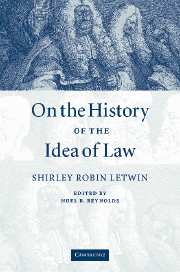Book contents
- Frontmatter
- Contents
- Editor's preface
- Introduction: The idea of law
- Part I Law anchored to a cosmic order
- Part II The Christian revision
- Part III The modern quest
- Part IV The significance of rules
- Part V The idea of law repudiated
- 12 Marxist theories
- 13 Political jurisprudence I: From Realism to feminist jurisprudence
- 14 Political jurisprudence II: Ronald Dworkin
- Part VI New foundations
- Index
14 - Political jurisprudence II: Ronald Dworkin
Published online by Cambridge University Press: 22 September 2009
- Frontmatter
- Contents
- Editor's preface
- Introduction: The idea of law
- Part I Law anchored to a cosmic order
- Part II The Christian revision
- Part III The modern quest
- Part IV The significance of rules
- Part V The idea of law repudiated
- 12 Marxist theories
- 13 Political jurisprudence I: From Realism to feminist jurisprudence
- 14 Political jurisprudence II: Ronald Dworkin
- Part VI New foundations
- Index
Summary
Radical as these criticisms are, none constitutes so thorough an attack on the idea of law as the theory of Ronald Dworkin. His attack is all the more effective because, far from identifying himself with political jurisprudence, he claims – at least sometimes – to be defending a strict understanding of the rule of law. His thorough treatment of the systemic restraints surrounding judicial decision-making allows his theory, he says, to solve difficulties that, though recognized, had not been adequately dealt with by his positivist predecessors. Furthermore, by recognizing such restraints, Dworkin addresses the judicial subjectivity thought inimical to the traditional idea of law much more effectively than other political or realist legal theories. By positioning his theory between two leading jurisprudential schools while at the same time presenting it as an exercise in traditional jurisprudence, Dworkin exposes more precisely what is at issue between the new and old attitudes toward law while at the same time successfully disguising the radical nature of his attack.
Dworkin argues that even in hard cases where there are no clear answers, judges are still bound by a web of principles, political theories, and cultural norms. They are not, therefore, free to act as unbound legislatures when existing law dictates no obvious solution. However, in developing his argument Dworkin also asserts that in any judicial action, whether interpreting law and precedent or breaking new legal ground, judges rely on a personal legal theory which combines political, cultural, and legal considerations.
- Type
- Chapter
- Information
- On the History of the Idea of Law , pp. 276 - 304Publisher: Cambridge University PressPrint publication year: 2005



